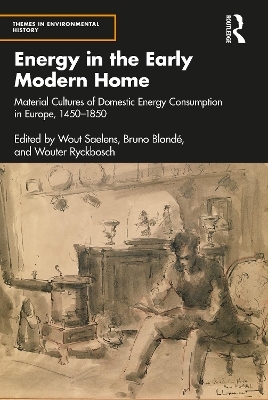
Energy in the Early Modern Home
Routledge (Verlag)
978-0-367-68135-7 (ISBN)
This book delves deeper into the interactions between early modern consumers and the ecological constraints of the world surrounding them. Experts on specific aspects of domestic energy use departing from different case studies in early modern Europe confront these central issues. This book therefore offers a wide range of approaches within a long-term and comparative perspective. Different ‘material cultures of energy’ across time and space and across different climates in Europe are explored.
Ultimately, this book aims to consider how the early modern home not just adapted to energy changes, but perhaps even prepared the way for our modern addiction to fossil energy. Energy in the Early Modern Home is the perfect resource for students and scholars of early modern Europe, premodern environmental history, the history of consumption and material culture, and the history of science and technology.
Wout Saelens (1993) is a postdoctoral researcher at the University of Antwerp and the Vrije Universiteit Brussel. He has a broad interest in the urban history of social inequality, material culture and ecological development from the late Middle Ages to the nineteenth century. Bruno Blondé (1964) is a full professor of the history department at the University of Antwerp. His major research interests include the history of economic growth and social inequality, urbanisation, and material culture and consumption in the early modern Low Countries. Wouter Ryckbosch (1984) is associate professor in urban history at the Vrije Universiteit Brussel, where he is also the director of the research group HOST (Historical Research into Urban Transformation Processes). His primary research interests are the history of inequality and social relations and the application of techniques from digital humanities to history.
Introduction. Part 1. Continuity and change in the search for domestic warmth: material culture, fuels, practices (France, sixteenth-nineteenth centuries) 2. A Flaming Renaissance. The material culture of staying warm in the Venetian artisan’s home (sixteenth-seventeenth centuries) 3. Between home and manufacturing. The use of wood and charcoal in early modern Northern Italy: two case studies Part 2. 4. Fireplaces and stoves as icons of comfort 5. Material cultures of warmth in England and Sweden during the long eighteenth century Part 3. 6. The kitchen: an early modern power house? Antwerp, sixteenth-eighteenth centuries 7. Warmth for men: kitchens and stables in peasant houses in Italy (seventeenth-eighteenth centuries) 8. Energy usage in the kitchen: heat and material culture in sixteenth- and seventeenth-century Dutch cookbooks 9. Energy and the functional specialisation of domestic space in eighteenth-century Ghent and Leiden: the early modern home as an ‘energyscape’ Part 4. 10. ‘Those closest to the fire enjoy the most of its glow’. Inequality and energy in eighteenth-century Flanders
| Erscheinungsdatum | 04.08.2023 |
|---|---|
| Reihe/Serie | Themes in Environmental History |
| Zusatzinfo | 15 Tables, black and white; 51 Line drawings, black and white; 26 Halftones, black and white; 77 Illustrations, black and white |
| Verlagsort | London |
| Sprache | englisch |
| Maße | 156 x 234 mm |
| Gewicht | 480 g |
| Themenwelt | Geschichte ► Allgemeine Geschichte ► Mittelalter |
| Geschichte ► Allgemeine Geschichte ► Neuzeit (bis 1918) | |
| Geisteswissenschaften ► Geschichte ► Regional- / Ländergeschichte | |
| Naturwissenschaften ► Biologie ► Ökologie / Naturschutz | |
| Technik ► Umwelttechnik / Biotechnologie | |
| ISBN-10 | 0-367-68135-8 / 0367681358 |
| ISBN-13 | 978-0-367-68135-7 / 9780367681357 |
| Zustand | Neuware |
| Haben Sie eine Frage zum Produkt? |
aus dem Bereich


